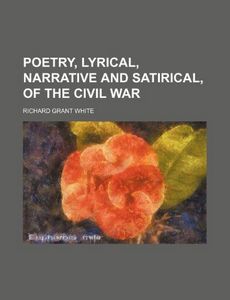.Poetry Lyrical,Narrative and Satirical of The Civil War, selected/edited by Richard Grant White,published by The American News Company,1866,hardcover with 334 pages
Richard Grant White (23 May 1822–8 April 1885) was a Shakespearean scholar who was born and died in New York USA.[1]
He graduated from New York University in 1839, studied medicine, then law, and was admitted to the bar in 1845, then became a journalist. He was a longtime Chief of the Revenue Marine Bureau.
From the cambridge history of english and american literature....
It was probably this collection that formed the basis of the selections from Southern poetry published as an appendix to Richard Grant White’s Poetry, Lyrical, Narrative, and Satirical of the Civil War (1866). In his preface White says:
I have read all that I could discover of the war poetry, written by the confederated enemies of my government, and have preserved here all that, in a most catholic spirit, I deemed of any intrinsic merit or incidental interest. It was my original purpose to embody them with the substance of the volume, giving each piece its place in the order of time; but finding so little of this poetry which possesses any kind of interest, instead of scattering it sparsely through the collection, I put it in an appendix. The secessionists fought much better than they wrote; and it is worthy of remark that the best poem on that side, “The Conquered Banner” was published in a New York newspaper, The Freeman’s Journal.
Omitting the humorous poems published by Moore, White has only the ten or twelve of a more serious and important nature, and these, in the main, not the ones that might be considered the most important by the leading Southern poets. The selections are a good illustration either of the difficulty of getting hold of Southern poems or of a provincial point of view that happily no longer exists.
